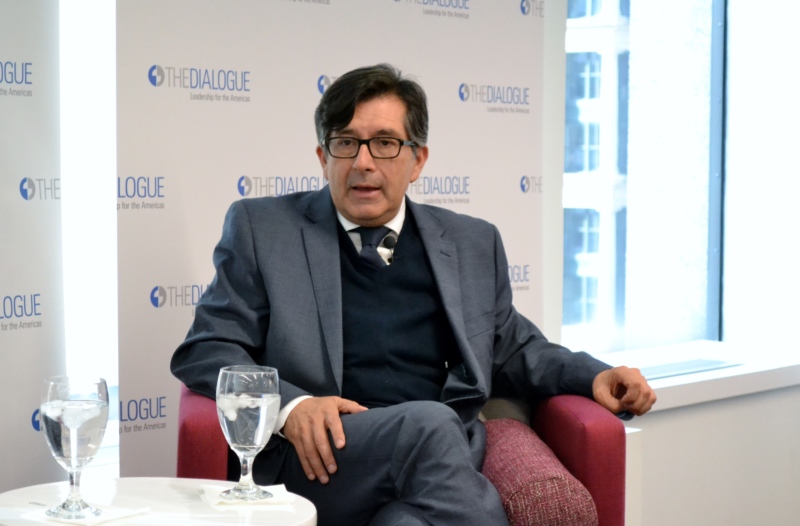A Conversation with the US Ambassadors to the Andean Region
Despite continued tensions among the Andean countries, four U.S. ambassadors painted an encouraging picture of regional stability.
On February 12, the Inter-American Dialogue hosted César Montúfar for an open discussion, moderated by Michael Shifter, about Ecuador’s current political climate. Montúfar is an academic, former member of Congress, a prominent political analyst, and the primary accuser in a recent trial against former vice-president Jorge Glas.
Many political observers had reasonably anticipated President Lenin Moreno from Correa’s Alianza País party to follow his predecessor’s footsteps when he assumed office. On the contrary, Moreno has so far governed in open defiance to Correa’s legacy. Actions taken, such as the February 4 consulta popular, took many by surprise, including Correa. This sharp contrast in style has led Ecuadorians to believe that change is happening in their political system. Shifter asked Montúfar to explain why it is happening, to what extent the changes are significant, and what are the challenges going forward.
“This dispute between @Lenin and @MashiRafael is for control of the ruling party” within a single-party context - @cmontufarm #EcuadorDialogue pic.twitter.com/MXl4ij3SL9
— The Inter-American Dialogue (@The_Dialogue) February 12, 2018
Montúfar repeatedly stressed that what is happening is a dispute within the dominant party, Alianza País, which had established a one-party rule in the past decade. While Correa and Moreno are competing for influence within the ruling coalition, there will be minimal external changes. The Communications Law remains in force, civil society is cautious about engagement, and the president retains extensive control over state institutions. This struggle, therefore, reveals a “transition within the same hegemonic scheme” of the past decade. Montúfar further explained that it is necessary for one-party states to change from within the ruling factions before a democratic transition could occur. But he argued that the latter will not happen in Ecuador’s political system until competitive multi-party elections are restored.
Despite Moreno’s current popularity, he faces a couple of challenges. First, the economic conditions of the country are the government’s biggest problem. Public deficit continues to increase and the social security system is on the verge of collapse. The government has tried to pursue policies to encourage further investment, but greater reform is needed. Second, Moreno has to resolve the ruling party’s splintering before he can pursue his reformist policy agenda. The Correa-Moreno fight for influence in the political realm has paralyzed the government, distracting it from addressing pressing issues. Moreno will either have to break from the coalition or establish his dominance within it.
Looking forward, Montúfar noted that the opposition has been sidelined in the current political climate. It will not be until the next election where they could present themselves as viable alternatives. Another challenge is whether a viable governing coalition can form afterward. Moreno has emphatically stated his commitment to lead an Alianza País government, discarding the possibility of a coalition outside the dominant party. According to Montúfar, the Correa’s insistent presence in the political sphere depends on the outcome of the corruption cases against him. If Moreno strengthens the “anti-corruption regime,” it would be the most effective tool to incapacitate his rival.
Montúfar concludes that had the opposition won the last presidential election, nothing would have changed. The transition from within the party is the preferred alternative and has regenerated a “democratic climate” in Ecuador. Even if Moreno does not win another term, he at least did not follow Correa’s polarizing example.
Despite continued tensions among the Andean countries, four U.S. ambassadors painted an encouraging picture of regional stability.
At the Inter-American Dialogue, José Miguel Insulza described the events of September 30, in which Ecuadoran police brought the country to a standstill after they rioted and trapped President Rafael Correa in a Quito hospital for several hours.
How will diplomatic relations between Ecuador and the US be affected after the expulsion of US Ambassador Heather Hodges?
 Irene Estefanía González / Inter-American Dialogue
Irene Estefanía González / Inter-American Dialogue